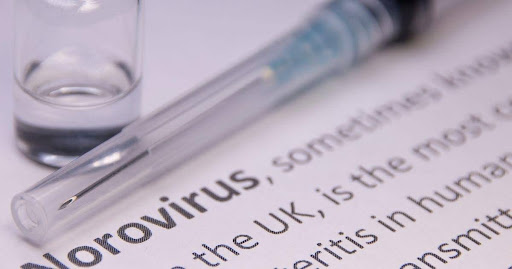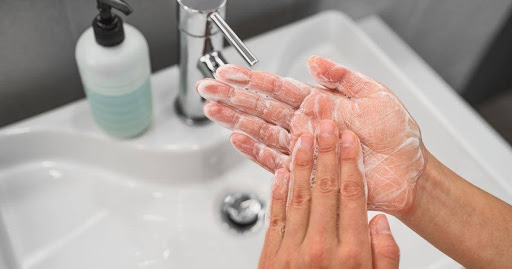Understanding and Managing Norovirus: Symptoms, Causes, and Recovery
6 min read
By DocGenie , Published on - 13 November 2024
Alt Text: Understanding Norovirus
Causes of Norovirus
Norovirus is very infectious and spreads via several transmission routes:
| Transmission Route | Description |
|---|---|
| Fecal-Oral Route | Contaminated food, water, or surfaces can transmit the virus. |
| Person-to-Person Contact | Close contact with an infected individual or touching contaminated surfaces followed by mouth contact |
| Aerosol Transmission | Tiny droplets in the air from coughing or vomiting can lead to infection. |
- Fecal-Oral Route:This is the primary mode of transmission. Viruses can spread through contaminated food, water, or surfaces.
- Person-to-Person Contact: Infection occurs when close contact with an infected individual is made, for example by touching a contaminated surface then touching your mouth.
- Aerosol Transmission: Infection may also occur from tiny droplets in the air, especially when coughing or vomiting.
Is Norovirus the same as the Stomach Flu?

Alt Text: Is Norovirus the same as the Stomach Flu
Yes, norovirus is often referred to as the "stomach flu." While it causes similar symptoms to the flu, such as vomiting, diarrhea, and stomach cramps, it's important to note that they are caused by different viruses. The flu is a respiratory illness caused by the influenza virus, while norovirus specifically targets the gastrointestinal tract.
Symptoms of Norovirus
Norovirus usually attacks fast, with symptoms showing up within 12 to 48 hours of infection. These symptoms can be pretty nasty and may include:| Symptom | Description |
|---|---|
| Severe Vomiting | Often the most prominent symptom, leading to discomfort and dehydration. |
| Watery Diarrhea | Frequent loose stools contributing to fluid loss. |
| Nausea | A feeling of unease in the stomach, often preceding vomiting. |
| Abdominal Cramps | Pain or discomfort in the abdomen, varying in intensity. |
| Headache | Commonly experienced alongside other symptoms. |
| Muscle Aches | General fatigue and body aches can occur. |
| Low-Grade Fever | Some individuals may experience a mild fever as part of their body's response to infection. |
- Severe Vomiting: This is often the hallmark symptom of norovirus, leading to significant discomfort and dehydration.
- Watery Diarrhea: Frequent, loose stools can further contribute to fluid loss and electrolyte imbalance.
- Nausea: A feeling of unease in the stomach, often preceding vomiting episodes.
- Abdominal Cramps: Pain or discomfort in the abdomen, ranging from mild to severe.
- Headache: A headache may be experienced in conjunction with other symptoms, contributing to overall discomfort.
- Muscle Aches: General muscle aches and fatigue can contribute to a weakened state.
- Low-Grade Fever: Some people may experience low-grade fever, which further indicates the body's response to infection.
Preventing the Spread of Norovirus

Prevention is key to limiting norovirus transmission:
- Frequent Handwashing: Hands should be vigorously washed with soap and water after a visit to the toilet, changing diapers, and prior to meals.
- Thorough Surface Disinfection: Regularly clean and disinfect frequently touched surfaces, such as countertops, doorknobs, and toilet handles, using a bleach-based disinfectant.
- Avoid Sharing Personal Items: Avoid sharing utensils, towels, and other personal items with infected individuals to avoid spreading the virus.
- Safe Food Handling Practices: Wash fruits and vegetables thoroughly, cook food at the right temperature, and prevent cross-contamination when preparing food.
- Stay Home When Sick:If you're experiencing norovirus symptoms, stay home to prevent spreading the virus to others. This includes avoiding work, school, and social gatherings until symptoms have resolved.
Managing Norovirus Symptoms
While there's no specific medication to treat norovirus, there are strategies to manage symptoms and promote recovery:| Management Strategy | Description |
|---|---|
| Stay Hydrated | Drink fluids to replace lost fluids; oral rehydration solutions are particularly beneficial. |
| Eat Bland Foods | Consume easily digestible foods like rice, toast, bananas, or crackers. |
| Rest | Allowing the body to recover is essential. |
| Over-the-Counter Medications | Consult a healthcare provider before using medications for nausea or diarrhea, especially in children. |
- Stay Hydrated: Drink plenty of fluids to replace fluids lost through vomiting and diarrhea. Oral rehydration solutions (ORS) can be particularly helpful in severe cases.
- Eat Bland Foods: Take rice, toast, bananas, or crackers that are easily digestible. Avoid greasy, spicy, or fatty foods.
- Rest: Rest is essential so that the body can recover.
- Over-the-Counter Medications: Although over-the-counter medications such as anti-nausea and anti-diarrheal medication can offer some relief, it is important to contact a healthcare provider before using it, especially in children and people with other medical conditions.
The Role of Telemedicine in Norovirus Management
Telemedicine provides an accessible and efficient way to deal with norovirus. It is very helpful when actual visits are not possible. You can consult a healthcare provider through telemedicine and hence:
- Receive Prompt Diagnosis: A telemedicine professional can examine your symptoms and give you a diagnosis depending on your symptoms.
- Get Personalized Treatment Advice: Your healthcare provider can suggest specific ways you can handle your symptoms such as hydration guidelines, dietary advice, and over-the-counter medicines.
- Monitor Your Condition: Repeated telemedicine check-in can help you monitor your symptoms and ensure that they improve.
- Avoid Unnecessary Exposure: Telemedicine appointments can help you avoid potential exposure to other illnesses by limiting your visits to healthcare facilities.
DocGenie makes it simple and easy to talk to a doctor about norovirus. With a video call, you can connect with a doctor without leaving your home. DocGenie lets you get quality healthcare from anywhere, in a cost-effective way.
When to Seek In-Person Medical Attention
While most cases of norovirus resolve on their own, it's important to seek in-person medical attention if you experience severe symptoms, such as:
- Persistent vomiting or diarrhea
- Signs of dehydration, such as decreased urine output, dry mouth, or dizziness
- High fever
- Bloody stools
- Severe abdominal pain
Read Also: Guide To Critical Care And Infectious Diseases
In Conclusion
The norovirus is a common infection and an unpleasant illness that occurs very frequently, but through proper hygiene practices and early medical attention, it can be effectively managed. This understanding of the mode of transmission and symptoms can help you be proactive in preventing infection and minimize its impact on your health. Telemedicine allows easy and effective access to healthcare providers, especially in outbreak conditions or when it may not be feasible to visit a health provider in person. Keeping informed and taking necessary precautions will protect you and your loved ones from the spread of norovirus.



